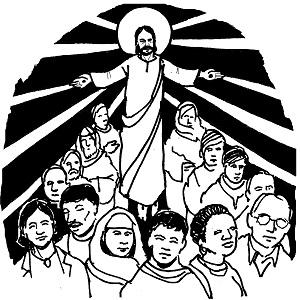
“God chose the foolish … and the weak … and the lowly …”(1 Cor 1:27 ff.).
Fourth Sunday in Ordinary Time
Zep 2:3; 3:12-13; Ps 146; 1 Cor 1:26-31; Mt 5:1-12a
Nowhere do we more confront the paradoxical nature of the gospel than in the Beatitudes. Jesus proposes a profile for his disciples that is the antithesis of worldly success. Think of the opposing profile touted by the dominant culture today: “Blessed are the rich, the strong, the winners, the satisfied, the care-free and the secure.” How foolish to imagine those outside this inner circle as in any way blessed. And today we see an even more shameful effort to exclude the world's most vulnerable people to protect this gated enclave of privilege.
Yet, Jesus proclaims that God is with the poor and the meek, the sorrowful, the merciful, the pursuers of peace and justice, the rejected and persecuted. Even more astonishing, Jesus reflects in his own life a God who exercises supreme power in apparent weakness, moving others to goodness not by force but by love, not by threats but with mercy.
What made Jesus’ message so paradoxical and challenging was that he proposed this path in a world he saw as so often built on the pursuit of social standing, honor, family and tribal loyalty, reciprocal favor or threat to enhance and protect personal well-being. No one imagined any value in not going along to get along, or in conceding any advantage in the everyday competition to get ahead.
To follow Jesus meant stepping apart from the “real world” into a risky, vulnerable existence wholly dependent on God and on the community of faith. Jesus’ dream of the Kingdom of God was based on mutual trust, openness, shared resources and table conviviality. Within this alternate circle of blessing, everyone had enough, witnessed miracles of healing and reconciliation, and shared a common good marked by abundance and joy.
We see glimpses of this beloved community in the four gospels and in Luke’s Acts of the Apostles. The early church is depicted as a kind of utopia where the Beatitudes were possible. This is not to say that it was easy or automatic. Discipleship was a way of life both realized and strived for, a reality both here and not yet here, requiring continual conversion and growth inspired by the mystery of the crucified and risen Christ present within the community.
Jesus knew the Kingdom of God was a process, like planting seeds that promised increase in time. In the Sermon on the Mount, which begins with the Beatitudes, he invites his followers to be salt and light, leaven and seed, trusting that if they did their small part God would grant the increase. He set the example of how this growth would take place by emptying his life into the movement to reveal the blessing of resurrection promised to every disciple. He lived the Beatitudes by becoming poor, meek, grieving and rejected as the road to genuine glory. Worldly success is dust in the wind compared to the eternal destiny of the pure of heart, the peacemakers who are God’s own children.
We will know this pilgrimage only by walking it, day by day, step by step, little by little. There is plenty of evidence that it works if we look at the lives of saints and consider the people we know who seem joyful and at peace in the midst of life’s uncertainties and contradictions. They say to us, “Don’t be afraid, and don’t hesitate to come along, for this is the way home and the joy of the Gospel."







